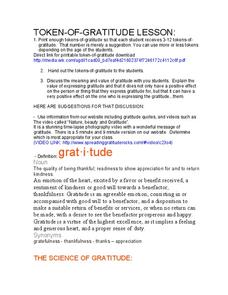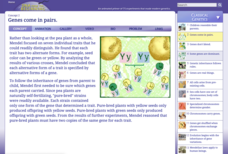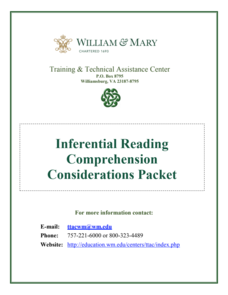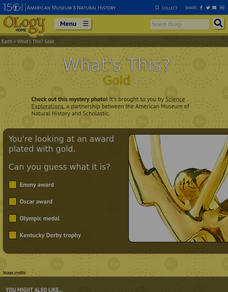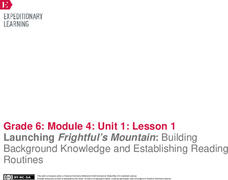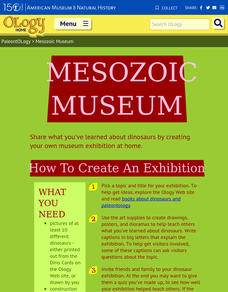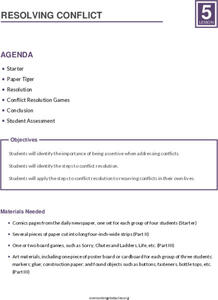Society for Science & the Public
Easter Islanders Made Tools, Not War
When studying artifacts, especially tools, how do archaeologists determine what the devices were used for? In what ways might researchers' previous experiences influence their perception of an artifact? An article about researchers'...
Institute for Humane Education
In Your Face: Reclaiming Billboards
Ads here, ads there, ads everywhere—but what do they communicate? Pupils discuss this topic and develop a list of personal values. They then work as creative directors at an advertising firm to create billboards that reflect community...
Little Kids Rock
The Influence of Latin Music in Postwar New York City
Music has often been called the international language that transcends cultures and regions. Scholars analyze the impact of Latin American music on New York City culture in the years following World War II. They research music, video,...
Spreading Gratitude Rocks
Token of Gratitude
What would the world be like if everyone expressed gratitude? Pupils explore the concept by watching a motivating time-lapse video. Scholars express appreciation by handing out tokens of gratitude, and then write about their experiences.
Tidewater Community College
Assignment: The “Big Mac” Index
Young economists learn about the method of predicting changes in the exchange rate with Big Macs in an instructional video. After an understanding the index, learners write a post on a discussion board and respond to class members' posts...
Biology Junction
Water, Solutions, pH, and Buffers
What common chemical includes safety warnings for being harmful if swallowed or inhaled, causes serious eye damage, and needs to be cleaned up immediately if spilled on the floor? Surprisingly, the dangerous chemical turns out to be...
Cold Spring Harbor Laboratory
Genes Come in Pairs
Mendel was the first to look at individual traits within a species. Step in his shoes as an interactive lesson takes users through his journey. An animation describes the design of his experiments and how he isolated individual traits to...
Poetry4kids
How to Start a Poetry Journal
Practice makes proficient! Using a journal of their choice, authors organize pages, then begin their writing journey of on-going writing practice in which they compose all poetic forms including diamante, limerick, free verse, and more!
William & Mary
Inferential Reading Comprehension Considerations Packet
Don't forget to read between the lines! Educators learn tips and activities to help scholars learn to infer to increase reading comprehension. Activities suggested include think alouds, backwards words, and who's who. the packet includes...
Southern Poverty Law Center
Analyzing Gender Stereotypes in Media
Why might toy advertisers use gender stereotypes to sell their products? Young people think critically about media messages and its role in gender stereotyping with a thought-provoking lesson.
Farmington Public Schools
British Literature Honors: Beowulf
Whether new to teaching Beowulf or an experience pro, you'll find much to like in a richly detailed unit plan that asks readers to consider how the epic represents the difficulty in defining good and evil but also reflects the changing...
American Museum of Natural History
Tornadoes Spinning Thunderstorms
Tornado winds can reach more than 200 miles per hour. Learners explore wind speeds and more characteristics of tornadoes with an online lesson. They learn how tornadoes form and how scientists attempt to predict them. Can be used as an...
American Museum of Natural History
What's This? Gold
Cell phones are likely made of gold—at least part of them! An interesting lesson explains the conventional and not-so-conventional uses of the popular element gold. From the Inca empire to modern-day technology, learners discover gold...
American Museum of Natural History
Create Your Own Time Capsule
The corona virus pandemic is indeed a historic event. A time capsule activity permits young historians to document these days of social distancing, remote learning, and quarantine by collecting artifacts that capture what their lives are...
PBS
Predicting/Making a Hypothesis
As an introduction to the hypothesis and testing method of investigation, young history detectives engage in a special investigation of a family artifact. After watching a short video that demonstrates the method, they develop a...
National Endowment for the Humanities
Ratifying the Constitution
Ratifying the Constitution was no simple task. Using primary sources, such as classic writings from the Federalists and Anti-Federalists, young scholars examine the arguments for and against the Constitution. They then decide: Would they...
EngageNY
Launching Frightful’s Mountain: Building Background Knowledge and Establishing Reading Routines
Welcome to Frightful's Mountain. The teacher introduces scholars to the text Frightful’s Mountain by reading the first chapter aloud. Learners then talk with a partner about the text. The instructor models answering focus questions as...
American Museum of Natural History
Talk to a Titanosaur
Learn all about the Titanosaur with an engaging website that delves deep into the large reptile's physical traits, family history, discovery, and fossil reconstruction.
American Museum of Natural History
Mesozoic Museum
Mini museum curators create an exhibit that showcases the Mesozoic era. Pupils use their knowledge of dinosaurs to make informative posters, drawings, and dioramas. Following three steps to complete the hands-on activity, scholars read...
Workforce Solutions
Discover Your Interests
Career exploration is the focus of a lesson plan that encourages pupils to choose a profession based on their strengths and interests. Following a thoughtful discussion covering different character traits, class members complete an...
EngageNY
Final Performance Task: Delivering an Opinion Speech with Multimedia Display
Welcome to the grand finale! Scholars practice reading their speeches to a partner and make last-minute changes based on feedback. Pupils then present their final opinion speeches to their small groups and show off their work in a...
PBS
Reading Adventure Pack: Birds
A Reading Adventure Pack takes a close look at birds. After reading a fiction and nonfiction book, scholars craft a thaumatrope, begin a birding journal using their sense of sight and hearing, and build a model bird using supplies from...
Overcoming Obstacles
Resolving Conflict
Win-lose, lose-lose, or win-win? The final lesson in the "Resolving Conflict Module" brings together all that participants have learned in the module. They first list and prioritize the steps in conflict resolution, then develop a plan...
Montana Natural History Center
Studying Grassland Ecosystems
At first glance, grassland ecosystems might seem dull and uninteresting, but once you start to explore it's amazing the things you'll find! Through this series of engaging lessons, activities, and experiments, elementary students examine...
Other popular searches
- Conserving Natural Resources
- Brazil Natural Resources
- Canadian Natural Resources
- New York Natural Resources
- Finite Natural Resources
- And Natural Resources
- Alberta's Natural Resources
- Natural Resources of Water
- Alaska's Natural Resources
- East Asia Natural Resources
- Conserve Natural Resources
- Natural Resources Michigan





